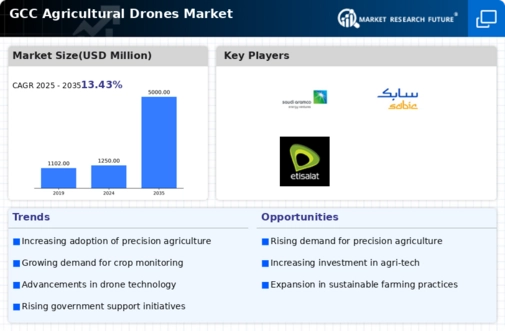GCC Agricultural Drones Market Summary
The GCC Agricultural Drones Market is projected to grow significantly from 1250 USD Million in 2024 to 5000 USD Million by 2035.
Key Market Trends & Highlights
GCC Agricultural Drones Market Key Trends and Highlights
- The market is expected to expand at a compound annual growth rate of 13.43 percent from 2025 to 2035.
- By 2035, the market valuation is anticipated to reach 5000 USD Million, indicating robust growth potential.
- In 2024, the market is valued at 1250 USD Million, reflecting a strong foundation for future expansion.
- Growing adoption of agricultural drones due to increasing demand for precision farming is a major market driver.
Market Size & Forecast
| 2024 Market Size | 1250 (USD Million) |
| 2035 Market Size | 5000 (USD Million) |
| CAGR (2025 - 2035) | 13.43% |
Major Players
Saudi Aramco (SA), Qatar Petroleum (QA), Emirates National Oil Company (AE), SABIC (SA), Etisalat (AE), Oman Oil Company (OM), Kuwait Petroleum Corporation (KW), Bahrain Telecommunications Company (BH)














